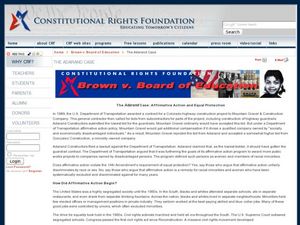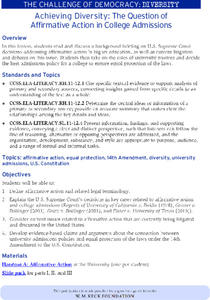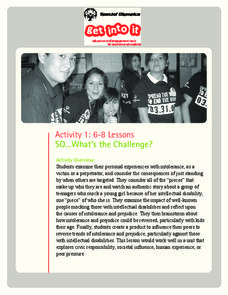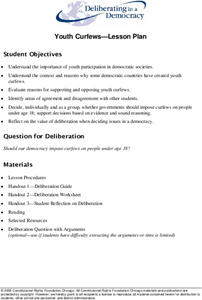Center for Civic Education
The Power of Nonviolence: Rosa Parks: A Quest for Equal Protection Under the Law
Teach young historians about the historical legacy of Rosa Parks with a multi-faceted lesson plan. Pupils follow stations and use journals to explore prominent events, analyze primary resource documents, and engage in interesting...
Curated OER
The Adarand Case: Affirmative Action and Equal Protection
Eleventh graders examine the Adarand case. For this American Government lesson, 11th graders create a list of reasons for each affirmative action program. Students develop a defense on certain issues and present it to the class.
Curated OER
Ban on Same-Sex Marriage: Does it Violate 'Due Process' and 'Equal Protection'?
Students examine due process and equal protection. In this current events instructional activity, students read the provided article, "Due Process and Equal Protection for Gays and Lesbians." Students respond to the provided discussion...
Curated OER
Equal Protection Questions
In this Supreme Court learning exercise, high schoolers respond to 14 short answer questions regarding equal protection and gay marriage issues in the United States.
National Woman's History Museum
The Equal Rights Amendment
The debate over the Equal Rights Amendment continues. To better understand the controversy, class members research the history of attempts to get the amendment ratified. In addition, pairs engage in a structured academic conversation...
Constitutional Rights Foundation
Achieving Diversity: The Question of Affirmative Action in College Admissions
How can a college board of trustees both increase cultural and racial diversity and offer all incoming learners equal protection under the Fourteenth Amendment? Class members debate the question using readings about how colleges use...
Curated OER
Korematsu v. United States (1944)
Students examine equal protection. In this Supreme Court lesson, students examine primary documents from Korematsu v. United States and discuss the implications of the decision with regards to Japanese internment.
Constitutional Rights Foundation
Plyler v. Doe: Can States Deny Public Benefits to Illegal Immigrants?
Illegal immigration is an ever-changing source of consistent controversy. A reading passage about the rights of undocumented workers and illegal immigrants—and the lack thereof—guides high schoolers into a mock trial activity. Three...
Curated OER
Should Homosexuals Have the Right to Laws Protecting Them From Discrimination?
Students explore discrimination issues in America. In this homosexual rights lesson, students listen to their instructor lecture on antidiscrimination laws and gay rights. Students respond to questions about the Romer v. Evans case.
Curated OER
The Ongoing Debate: Crime Control v. Due Process Protection
Young scholars investigate the Exclusionary Rule and other ways of to enforce the protections found in the Bill of Rights. They study how effective criminal control and public safety is carried out while citizens Constitutional rights...
State Bar of Texas
Baker v. Carr
Can the federal government override the state government to protect the citizens of the United States? The 1962 Supreme Court case Baker v. Carr outlines the issue of equal protection under the law. Scholars investigate with a short...
ProCon
Gay Marriage
The first legal gay marriage in the United States occurred in Massachusetts in 2004. Since then, countless others have tied the knot. Scholars decide whether gay marriage should be legal by reading a history of the issue, analyzing the...
Teaching Tolerance
Changing Demographics: What Can We Do to Promote Respect?
America has always been seen as a melting pot to the world. Scholars research the concept of blending cultures in the United States and how it is changing over time. The final lesson of a four-part series analyzes the changing...
Curated OER
Bringing Animal Issues into the Classroom: César Chávez
Fifth graders get critical and political while they begin thinking about human and animal rights in relation to the US Constitution. This hand out includes answers to several questions regarding Cesar Chavez and his work to secure rights...
Curated OER
Separate But Equal Video
Eighth graders watch the video "Separate But Equal." They choose an incident or event from the video that is interesting or meaningful to them and write an objective news article and an editorial.
Curated OER
Constitutional Issues: Civil Liberties During War
Students discuss democratic ideals and constitutional principles. They decide which side of the issue they are on dealing with the placement of Japanese-Americans in camps during World War II. They examine primary source documents for...
Equality and Human Rights Commission
Taking Action
The Universal Declaration of Human Rights passed in 1948 when the majority of members of the United Nations voted in favor of the resolution. Scholars use their knowledge of human rights to determine ways they personally can help promote...
Curated OER
We the People: Promise and Practice in our Constitution
Students examine the concept that the constitutional government guarantees that our government is not all-powerful and analyze the purposes of our government that are listed in the Preamble. They assess that equality under the law and...
Special Olympics
SO…What’s the Challenge?
Whose responsibility is it to protect equal rights? Class members engage in a series of activities that create awareness of the prejudice and intolerance persons with disabilities face. They then create a message addressed to their...
Deliberating in a Democracy
Youth Curfews
Don't stay out too late! Scholars analyze the need for youth curfews in a democratic society. They examine primary documents, case studies, and short video clips to form their opinions and take a position on the issue. Holding a class...
Curated OER
It's Your Right: A Civil Rights Brochure
Learners examine the US Constitution, Bill of Rights, and Supreme Court cases in order to broaden their understanding of the US Judicial System. They research a variety of textual and Internet resources to create a tri-fold brochure,...
K12 Reader
Slavery in the Constitution
Your young historians will read excerpts from three parts of the United States Constitution—Article One, the Thirteenth Amendment, and the Fourteenth Amendment—and discuss how they each address the issue of slavery.
School Improvement in Maryland
Immigration Legislation
What is the purpose of immigration legislation? How has this legislation evolved over the years? What are the factors that caused these changes? Class members research immigration legislation to determine whose rights the laws are...
US Institute of Peace
Governance, Corruption and Conflict Simulation on Nepal
Can your class help the people of Nepal? Scholars take an in-depth look into the social injustices and struggling economy of a country in turmoil during a multi-day role-playing exercise. After reviewing information on the problems...

























